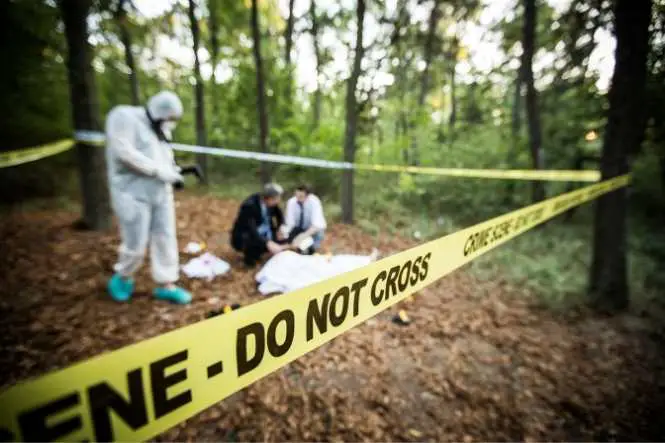A crime scene investigator (CSI) is either a member of law enforcement or a skilled individual with a scientific background who is responsible for securing crime scenes and collecting and cataloging all physical evidence at a crime scene for forensic analysis. The prosecution’s case is then built upon the evidence collected by the crime scene investigator.
For more information about the role of a crime scene investigator in a criminal investigation and how to become one, continue reading.
What are the duties of a crime scene investigator?
A crime scene investigator plays a critical role during a criminal investigation. The expertise of a crime scene investigator is especially needed at the forefront of a case, literally at the scene of the crime.
After arriving at a crime scene, the first responsibility of a crime scene investigator is to properly seal off the scene from any potential contamination or tampering. Doing so is paramount to retaining the validity of the evidence gathered at the scene, and if a crime scene investigator fails to ensure the crime scene is intact at the start of evidence collection, all evidence gathered at that particular scene could be rendered useless.
Once the scene of a crime has been roped off, a crime scene investigator begins to comb through the site in search of any potential piece of evidence that can aid in building the prosecution’s case. This is a meticulous job, as the crime scene investigator photographs nearly every inch of the scene and carefully gathers and documents anything the offender(s) might have left behind when fleeing the scene.
These pieces of physical evidence are then diligently packaged by the crime scene investigator and sent off to a lab for forensic analysis.
What crime scenes do crime scene investigators inspect?
Crime scene investigators lend their expertise to many different kinds of crime scenes. Although, they are typically utilized in the case of a homicide, burglary, sexual assault, or vehicular accident.
The type of physical evidence collected from the scenes of these different types of crimes will vary, but a crime scene investigator’s approach and protocol will remain the same each time.
What evidence does a crime scene investigator collect?
The type of physical evidence collected at a crime scene varies, however, a crime scene investigator might collect fingerprints, blood samples, tire tracks, locks of hair, bullet shells, footprints, and more at a particular scene.
When at a crime scene, the crime scene investigator must be vigilant. Not all of what a crime scene investigator collects may be relevant to the crime in question. However, it is imperative for the crime scene investigator to scrutinize even the most seemingly insignificant article or object as it might be what breaks the case.
Does a crime scene investigator perform the forensic analysis of evidence?
A crime scene investigator might participate in the forensic analysis of the physical evidence collected at a scene if they have training in certain data analysis such as fingerprint processing. However, more often than not, the crime scene investigator transfers the evidence to a lab where a forensic technician will handle the analysis of the samples. These forensic technicians may be chemists, biologists, or toxicologists.
This analysis is particularly important in recreating the crime to demonstrate the sequence of events of the crime and the timeline for which it occurred. Though the crime scene investigator might not handle the forensic analysis piece of the puzzle, they do often help with the scene recreation and theory formation.
Do crime scene investigators testify?
One of the most important parts of a crime scene investigator’s job is testifying on behalf of the prosecution or in some cases, the defendant. In their testimony, crime scene investigators speak to the validity of evidence gathered at the scene, the proper handling of such evidence, and theories of what transpired at the crime scene.
The crime scene investigator’s testimony carries heavy weight as it can result in either securing the conviction of the rightful offender or the vindication of an innocent defendant.
How does one become a crime scene investigator?
There are several job requirements and prerequisites to becoming a crime scene investigator.
- Possess a relevant bachelor’s degree: It is often a prerequisite for earning the coveted title of a crime scene investigator to have earned a bachelor’s degree in a related field, such as in criminal justice, computer science, forensic science, or biology.
- Have job experience: Some jurisdictions or departments require relevant job experience, such as an internship in the field or being a member of law enforcement, such as a police officer, before being considered for the position of crime scene investigator.
- Earn the appropriate certifications and licenses: Although in some places, certifications and licenses are not necessary, earning certification or license only helps set you up for success. The International Crime Scene Investigators Association offers several certifications to those interested and qualified. Typically, the certifications require that you are an active member of law enforcement.
A crime scene investigator may work for the local sheriff’s office, federal law enforcement agencies like the FBI, or private investigators, and they are most often found at a crime scene, in a lab, or at the morgue.
What skills and characteristics should I have to become a crime scene investigator?
Crime scene investigators are highly-skilled individuals that possess certain characteristics that make them successful in this position. These individuals are usually detail-oriented with strong analytical thinking skills but also have the capability to see the larger picture. They have an unwavering sense of responsibility and are ethical by nature. In addition, these professionals must be able to work in unsanitary and gruesome conditions.
Being a crime scene investigator is a job unlike any other. These individuals work hand-in-hand with law enforcement, forensic scientists, and medical examiners to recreate crime scenes and develop theories as to how a crime unfolded. They are an essential piece of the criminal justice process and are one of the most valuable witnesses to a prosecution’s case.


